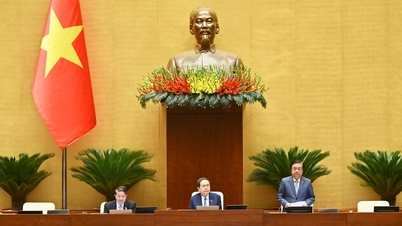
Continuing the working program on the morning of November 4, the National Assembly listened to Minister of Finance Nguyen Van Thang report on the draft Law on Tax Administration (amended), the revised Law on Personal Income Tax (PIT), and the Law on Thrift and Anti-Waste.
Regarding the Law on Personal Income Tax (amended), Mr. Nguyen Van Thang said that the draft law focuses on perfecting current regulations, while adding new mechanisms to manage income sources and decentralize and delegate authority in policy adjustment.
In particular, the adjustment of family deductions and progressive tax schedules are expected to directly impact taxpayers with income from salaries and wages. The draft law has increased the deduction for the taxpayer himself to 15.5 million VND/month; the deduction for each dependent to 6.2 million VND/month.
With this new deduction, individuals do not have to pay tax if their income is from 17 million VND/month (if no dependents) or 24 million VND/month (if 1 dependent) or 31 million VND/month (if 2 dependents).
For individual businesses, the tax-free revenue threshold is adjusted up to VND 200 million/year to ensure consistency with the provisions of the Law on Value Added Tax.

Notably, the draft Law supplements provisions to expand the scope of tax management to newly arising types of income.
Accordingly, for the transfer of gold bars, the draft law stipulates personal income tax at a rate of 0.1% on the transfer price each time. The Government, based on the gold market management situation, will stipulate the time of application, the taxable gold bar value threshold and adjust the tax rate.
Along with that, the draft also adjusts the income threshold to determine taxable income for some income items from 10 million VND to 20 million VND, applicable to income from winning prizes, royalties, franchises, inheritances, and gifts.
The Draft Law is expected to take effect from July 1, 2026. However, to synchronize with the application time of the new family deduction level, regulations for business individuals, progressive tax schedules and contents related to salaries and wages are expected to take effect earlier, from January 1, 2026.
Presenting the review report, Chairman of the Economic and Financial Committee Phan Van Mai stated that the regulation on family deduction is an important content, receiving special attention from the people. The Committee proposed to continue to specify the family deduction level in the draft law, without assigning the Government to regulate the family deduction level (Clause 1, Article 10 of the draft), because practical experience shows that the family deduction level is not adjusted too frequently, continuously and is not an urgent content that needs to be assigned to the Government to regulate.
In addition, taxable income is an important content, directly related to the legitimate rights of taxpayers, and needs to be specifically, clearly and transparently regulated in the law. On that basis, the Committee recommends that the drafting agency specifically regulate taxable income in the draft law and remove the provision assigning the Government to regulate other income.
Regarding the regulation that income from gold bar transfers is subject to tax, the Economic and Financial Committee has noted many opinions requesting appropriate consideration, due to concerns that this tax could cause inconvenience to people who transfer gold not for speculative or business purposes.
“Taxing people’s gold savings may not make sense in terms of humanity, society and economic management. We request the Government to provide information on the expected time of applying these regulations,” Mr. Phan Van Mai emphasized.
Regarding the effective date, the draft law stipulates that the provisions related to salaries, wages and business income will take effect from January 1, 2026, while the remaining provisions will take effect from July 1, 2026. However, the review agency proposed to stipulate that all provisions related to the calculation of tax obligations for salaried employees and business individuals will take effect at the same time to ensure feasibility. Many opinions suggested that the entire draft law take effect from January 1, 2026 so that the new regulations can soon be put into practice, the head of the Economic and Financial Committee added.
Source: https://www.sggp.org.vn/dieu-chinh-hang-loat-nguong-tinh-thue-thu-nhap-ca-nhan-post821580.html


![[Photo] Ho Chi Minh City Youth Take Action for a Cleaner Environment](https://vphoto.vietnam.vn/thumb/1200x675/vietnam/resource/IMAGE/2025/11/04/1762233574890_550816358-1108586934787014-6430522970717297480-n-1-jpg.webp)

![[Photo] Panorama of the Patriotic Emulation Congress of Nhan Dan Newspaper for the period 2025-2030](https://vphoto.vietnam.vn/thumb/1200x675/vietnam/resource/IMAGE/2025/11/04/1762252775462_ndo_br_dhthiduayeuncbaond-6125-jpg.webp)
![[Photo] Ca Mau "struggling" to cope with the highest tide of the year, forecast to exceed alert level 3](https://vphoto.vietnam.vn/thumb/1200x675/vietnam/resource/IMAGE/2025/11/04/1762235371445_ndo_br_trieu-cuong-2-6486-jpg.webp)

![[Photo] The road connecting Dong Nai with Ho Chi Minh City is still unfinished after 5 years of construction.](https://vphoto.vietnam.vn/thumb/1200x675/vietnam/resource/IMAGE/2025/11/04/1762241675985_ndo_br_dji-20251104104418-0635-d-resize-1295-jpg.webp)


































































































Comment (0)